El Mohán: Guardian of the Magdalena
Reading Time: 11 min
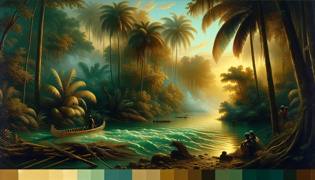
About Story: El Mohán: Guardian of the Magdalena is a Legend from colombia set in the 19th Century. This Descriptive tale explores themes of Nature and is suitable for All Ages. It offers Cultural insights. A legendary river guardian whose trickery defends Colombia’s waterways.
Introduction
Under the argent glow of a swollen moon, shadows danced on the muddy banks of the Magdalena River. The air was thick with the scent of wet earth and ripening guava. Fishermen whispered of El Mohán, a spirit both feared and revered. His eyes, they said, gleamed like distant lanterns through drifting mist.
His legend began when the colonists first ventured upstream, their wooden vessels like black beetles skittering over smooth stone. Tales grew in hushed camps: a hulking silhouette rising from placid eddies, scales shimmering with every twist of sinew. The river itself seemed to shiver at his approach. “¡Quiubo, parcero!” one old fisherman would joke, though his voice quavered. No hay mal que por bien no venga, he murmured, hoping for fortune but bracing for trickery.
El Mohán’s laughter ricocheted like pebbles across a canyon, unsettling hearts and reminding mortals of ancient pacts. Beneath wide palms dripping with dew, the spirit tested greed and rewarded humility. Some claimed he could shrink to the size of a cane rat or swell to fill an entire barge with a single glance. Each transformation was a fresh brushstroke on an ever-changing portrait of enchantment.
Among the reeds and water lilies, a faint rustle spoke of his presence: scales brushing bamboo stalks, heartbeat pulsing through submerged roots. The tang of brackish water lingered on skin. In local song and whispered counsel, he was guardian and trickster in one. His duty: to keep the river’s lifeblood pure. When men sought to poison its pools, El Mohán’s wrath crested like a tidal wave.
By dawn’s first blush, only footprints in slick clay offered proof. A clap of distant thunder, a taste of salt on the breeze—these were his signatures. Thus the legend wove itself into every village hearth, a reminder that nature’s own protector might be cunning, cruel, yet ever necessary.
Origins of the River Guardian
Long before the first canoe slid across the Magdalena’s glassy mirror, the river sang its own lullaby. In that era, the banks teemed with capybaras and water birds whose calls wove a tapestry of breath and motion. Deep within the jungle’s embrace, an indigenous shaman communed with spirits of current and stone. He spoke in whispered chants, invoking guardianship over fish, caimans and children of the water. As twilight settled, a figure materialised amidst phosphorescent mist—El Mohán, whose name in ancient tongue meant “he of deep currents.”
Clad in cobwebs of algae and scales as dark as polished onyx, he regarded the shaman with luminous eyes. A melody drifted from his throat, half growl and half lullaby, stirring reeds into gentle applause. The shaman offered him a gourd of fermented corn, and the spirit accepted with a slow, solemn nod. Thus was forged a pact: El Mohán would protect waterways, warding off poison and heedless plunder, while humans would honour the river with offerings and respect.
From that moment onward, fishermen lit small torches of guadua bamboo and cast nets with reverence. Villagers left baskets of yucca bread by the shore, praying for safe passage and bountiful catch. The river, in return, bristled with life. Otters darted like quicksilver beneath lily pads; turtles lazed on sunlit logs, and egrets stalked the shallows like elegant dancers. It was said that El Mohán thrived whenever the river did, drawing strength from its pulse. Should greed dim that pulse, his wrath would mirror a storm unleashed.
One morning, as dawn’s first light painted the sky in rosy threads, a fisherman named Isidro tested the pact. Disregarding custom, he hurled foul entrails into the current. The water frothed and blackened where the meat sank, a sickly plume that smelt of rot and regret. Suddenly, a roar shook the bank, rattling bamboo walls. Isidro froze, his net dropped like a dying bird. El Mohán rose, towering and furious, his form rippling with every ounce of indignation. The fisherman’s heart pounded in his ears, a cadence of dread and wonder.
Yet, even in anger, the spirit spoke with measured gravity. He taught Isidro that every creature—be it fish or human—shared the river’s breath. A single grievance against the current could doom them all. So the pact endured: honour the waters, and the guardian would stand vigilant. Break faith, and one would face his cunning retribution.
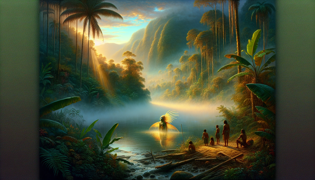
Trickery by Moonlight
On nights when the moon sailed high and round, like a silver gong in the heavens, fishermen recounted curious encounters. Some heard laughter drifting over the water, as if children played upstream. Others glimpsed lanterns bobbing where none should be, luring boats toward treacherous rocks. “He’s playing with them,” the elders would say, their voices low as the river’s whisper. Each illusion tested human integrity, unveiling greed or generosity.
Once, two brothers paddled in earnest pursuit of prize catfish. Their nets heavy, they dared the narrow crevice below a weeping willow. A lantern floated, beckoning them onward, its glow charting a safe course. Mesmerised, they turned their canoe toward it. Suddenly, the banks dissolved into jagged stone, and their prow struck granite with a spray of white foam. The lantern flickered, revealing El Mohán perched atop a boulder, mirth dancing in his dark eyes. The brothers froze, nets sloshing, breath caught between wonder and fear.
Yet the guardian offered no harm. Instead, he untangled their nets, disgorging silver fish back into the river’s cradle. Then he vanished, leaving only ripples and the faint echo of a melody. The brothers, chastened, retold the tale to villagers who bowed their heads before each crevice. From then on, every lantern set aglow at night bore small prayers to El Mohán, asking for safe passage.
In another encounter, a trader named Federico sought to divert the river’s flow, dreaming of sugarcane plantations on newly drained land. His workers built crude embankments cloaked in cedar logs. When waters swelled, they breached the dykes, flooding the camp and turning soil into treacle-thick mud. Sweet rain fell, ironically, whilst thunderstorms rolled. Workers fled, clutching tools as lightning fractured the sky. In the lashing rain, El Mohán strode through the torrent, his form shimmering like a living totem. He beckoned Federico with a crooked finger, then vanished—leaving the embankments washed away.
Federico returned to the village, soaked and shivering, to find fishermen awaiting him with stern faces. They chanted that no force on earth could outwit the guardian of the current. In humbling silence, he vowed never to hinder the river again. The air tasted of fresh rain and cedar smoke, and though his pride was bruised, his respect blossomed. Thus the spirit’s trickery preserved the river’s course, guiding mortals to honour the flow rather than challenge it.
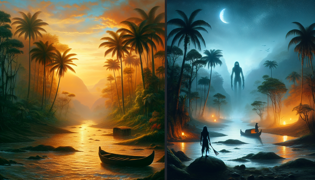
Trials of the Magdalena
Years unfurled like woven tapestry, and the Magdalena flowed through towns, cities and endless plantations. Yet the march of progress brought challenges: upstream sawmills felling mahogany, merchants dumping sawdust that choked swimmers. When a company nearly finished carving a new canal, villagers feared their homes would vanish like candles snuffed at dawn. A deputation rowed out to plead with El Mohán. They carried palm-weave baskets brimming with roasted corn and guava molasses, hoping to appease him.
The petition reached the river’s heart at midnight, beneath a sky strewn with stars like scattered diamonds. Silence fell, broken only by frogs calling and the soft lap of water against hull. Suddenly, mist curled along the surface, thick as wool, and a voice resonated from the depths: “Who dares disturb my realm?” Trembling, the leader spoke of livelihoods tied to the river’s mercy, of children who needed fish in their pots. He begged forgiveness and aid.
A vast hand emerged, scales gleaming like burnished copper. The spirit’s eyes, deep and ancient, surveyed the plea. Then, with a gesture as swift as a tropical breeze, he summoned currents to swirl around the canal site. Logs uprooted, canal trenches collapsed, and muddy sirens of warning sounded through the banks. The workers fled in terror, abandoning axes and dreams of easy fortune. The river reclaimed its course as though nothing had changed.
In the aftermath, villagers discovered paths scoured new yet familiar. El Mohán had sculpted hidden pools where fish thrived, creating sanctuaries veiled by hanging vines. They called these refuges “Los Ojos del Río,” eyes of the river, for they sparkled like mirrors amid emerald foliage. Here the water tasted of jasmine and fern, cool as a maiden’s sigh. Craftsmen shaped canoe prows with carved river motifs, honouring the guardian’s artistry and wisdom.
Despite his fury, the spirit remained a force of balance. He tested the heedless, scorned the rapacious, yet fed the humble with abundance. His presence was a reminder that nature’s heart beat strongest when respected. Those who listened to the river’s murmur learned patience and gratitude. In every swollen tide and gentle eddy, they heard the echo of his oath to guard the lifeblood of Colombia.
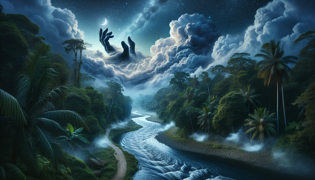
Legacy in Today’s Waters
In contemporary times, the legend of El Mohán endures like carved wood worn smooth by years of touch. Tourists gather at dusk beneath swaying palms, cameras raised to capture elusive shapes in twilight mist. Local guides recite the old idioms passed down by ancestors: "El río no olvida"—the river forgets nothing. Schoolchildren learn to leave pandebono and coffee by hidden pools, believing offerings keep the guardian content.
The Magdalena still pulses with life and commerce, steamboats rumbling alongside wooden canoes. In the hum of engines one might hear a faint chime of gravel beneath a canoe paddle or the distant call of howler monkeys. The air sometimes carries a hint of oil and tobacco, mingled with earthy tang of pimento trees. Near river towns, murals depict El Mohán as part fish, part man, his mouth open in a silent admonition. Children press their palms to painted scales, giggling as they imagine the spirit’s warmth.
Environmental stewards have embraced the myth as rallying cry. Cleanup brigades drift along hidden coves, scooping plastic and old nets. They whisper, "We serve under El Mohán’s watch." When solar-powered lamps glow at night to deter illegal fishing, fishermen nod respectfully, recalling tales of vanished nets and mischievous currents. One local saying endures: "Quien daña el río paga su pena." Those who harm the river pay the price.
Occasionally, villagers report uncanny happenings: nets brimming unexpectedly, flares of phosphorescence illuminating dark pools, ripples shaping words on the water’s surface. Some dismiss these as trick photography, others swear by personal encounter. Yet all agree that the river breathes still, and its guardian remains vigilant.
Thus the legend flows on, rippling through time. It teaches that the human heart and nature’s currents are intertwined, that every act upon the river echoes far beyond its banks. El Mohán, both protector and trickster, reminds Colombia that respect sustains life. And as long as fish swim and palms sway, his tale shall endure, a living parable in ever-moving water.
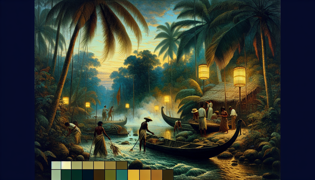
Conclusion
Even now, as dawn spills liquid gold across the Magdalena, villagers sense the spirit’s quiet vigil. Each ripple carries a whisper of ancient promise: harm not the river, lest its guardian rise. In woven baskets, offerings of coffee and arepas rest beside small carved figurines, tokens of gratitude and humility. The river’s pulse matches the heartbeat of all who dwell along its banks, forging a bond older than memory.
El Mohán remains a paradox: both mischief and mercy, trickster and protector. He challenges those who think themselves masters of nature, reminding us that the wild world refuses servitude. Underneath the turmoil of progress, the river’s steady flow reflects timeless wisdom: life thrives when respect presides. In local proverb and village counsel, his legacy endures—teaching each generation to honour the currents that sustain them.
So pause where water laps at the toes, breathe in the earthy perfume of river moss, and listen for the faint laugh of a hidden guardian. Feel the rough bark of a guadua stalk, smooth as polished bone under your palm. There, beneath midday sun or moonlit hush, El Mohán watches still. His tale flows onward, a living current that shall never cease.
















